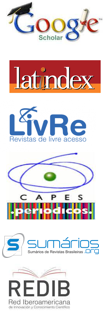Aplicativos Educacionais para Smartphone e sua Integração Com o Ensino de Química
DOI:
https://doi.org/10.17921/2447-8733.2016v17n5p398-403Resumo
A tecnologia digital é uma grande promessa para o ensino de Química na escola, acredita-se que a implementação dessas tecnologias produz melhoria na educação. No entanto, pouco se sabe sobre a articulação coordenada dos aplicativos para smartphone propostos para este fim e as demais representações semióticas tradicionais da Ciência e efeitos sobre a aprendizagem dos alunos. É importante acrescentar que a escola ainda não conseguiu integrar todas as mudanças da sociedade com a rápida evolução das tecnologias, afastando-se dos jovens inseridos nessa evolução. Ao professor se exige um esforço para a readaptação a essa integração, o papel desse educador deverá ser ativo e responsável no enquadramento pedagógico das tecnologias, para que possa tornar-se um meio de renovação do ensino e não apenas um mero reforço de práticas tradicionais. Atualmente, na área da Educação Química, nota-se que a informatização e os aplicativos tão acessíveis a qualquer classe da população, podem proporcionar situações de aprendizagem que acabavam restritas, pelo alto custo. Nesse contexto e, com o objetivo de conhecer os aplicativos para a Educação Química e o crescimento de sua oferta para incentivar sua adoção na educação, são trazidos, nesse artigo, os resultados de uma pesquisa sobre aplicativos para Android® relacionados à área, realizada a partir da busca de aplicativos em repositórios livres tais como Free and Open Source Software - FOSS® e Google Play® disponíveis em um período de 2012 a 2016, apresentando a evolução do número de aplicativos disponíveis, os temas mais recorrentes e indicando aplicativos para a Educação Química.
Palavras-chave: Ensino. Química. Aplicativos. Smartphone. Tecnologia Digital
Abstract
The use of digital technology holds great promise for teaching chemistry in school, it is believed that the implementation of this new technology produces education improvement. However, little is known about the coordinated joint applications for smartphone proposed for this objective and other traditional Sciences semiotic representations and effects on the students’ learning. It is important to add that the school was still not able so far to integrate all the changes in society with the rapid technology evolution, moving away from our young people who are inserted into this evolution. To the teacher, it is required an effort to rehabilitate this integration, the educator’s role should be active and responsible in the technologies educational environment, so they can become a means of teaching renewal and not just a mere reinforcement of traditional practices. Currently, in the Chemical Education area, it is noted that the computerization and applications so accessible to any class population can provide learning situations which used to be limited due to theirhigh cost. In this context and in order to knowthe Chemistry Education applications and the growth supply to encourage their adoption in education, are coveredin this article, the results of a survey on applications for Android® related to the area, accomplished from search applications for free repositories such as Free and Open Source Software - FOSS® and Google Play® available in a period from 2012 to 2016, showing the evolution of the number of available applications, the most recurrent themes and indicating applications for Chemical Education.
Keywords: Education. Chemistry. Applications. Smartphone. Digital technology.


